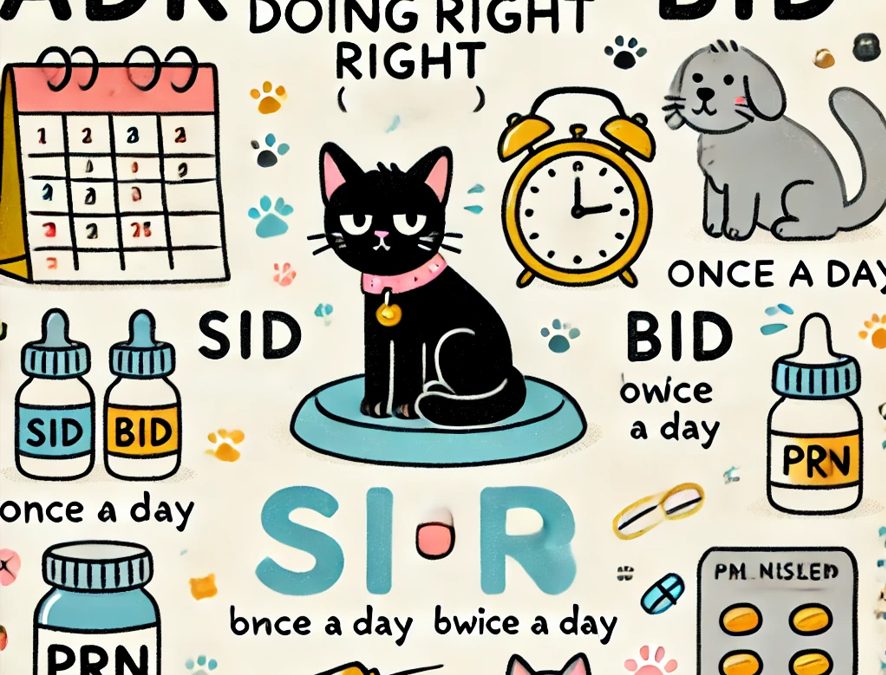Ever wonder why we say the things we do? Like why we tell people to “bite the bullet” when things get tough, or how veterinarians came up with their secret code for giving meds?
Every phrase has a story, and today, we’re diving into a few surprising ones—thanks to some fun facts from the Instagram page History Dose. Then, we’ll explore the shorthand terms veterinarians use that make you feel like you’re cracking a medical mystery code every time you pick up your pet’s prescription.
Everyday Phrases with Surprising (and Sometimes Weird) Origins
Let’s kick things off with some expressions you might not think twice about, but actually have pretty wild origins:
- Bite the Bullet: Ever been told to “bite the bullet” when you’re about to face something tough? Turns out, soldiers used to literally do this—bite down on a bullet to endure surgery before anesthesia was a thing. Yeah, I think I’d rather bite a pillow, thanks.
- Break the Ice: We’ve all been in awkward situations where we need to “break the ice.” This one came from ships breaking through ice in frozen waters to clear the way for bigger ships. So next time you’re making small talk at a party, just imagine yourself as an icebreaker ship, plowing through the awkwardness.
- Bury the Hatchet: Ready to make peace with someone? In the old days, Native American tribes would literally bury their weapons—like axes and hatchets—when they made peace treaties. Nowadays, we’re just left to awkwardly hug it out or avoid eye contact entirely.
Phrases that have survived centuries, even if their original meanings have faded into something much more symbolic (and less violent, thankfully).
Vet Speak: Decoding the Abbreviations Behind Animal Care
Now, let’s talk about a whole different kind of secret language—the shorthand terms veterinarians and Veterinary technicians use. The history of medical terms goes all the way back to the ancient Greeks, specifically Hippocrates. According to the National Institutes of Health, the oldest recorded medical writings are the Hippocratic records from the 4th and 5th centuries BC.
If you’ve ever looked at your pet’s prescription and wondered, “Wait, what’s SID? Or PRN?” you’re not alone. It’s like a secret code designed to keep things efficient . . . and maybe just to keep us guessing. But don’t worry, we’re about to break it down.
- SID – Once a Day (Latin: semel in die): SID might look like the name of your buddy from high school, but in vet speak, it means “once a day.” It’s straight out of Latin, which was the ancient world’s universal medical language. So when your vet says your dog needs its meds SID, they’re just saying, “Once a day, please. No need to overdo it.”
- BID – Twice a Day (Latin: bis in die): BID means “twice a day” and comes from—yep, you guessed it—more Latin. It’s like your pet’s doctor is asking you to set up a daily routine: morning meds with breakfast and evening meds with dinner. Because pets need schedules too, right?
- PRN – As Needed (Latin: pro re nata): PRN is the wildcard of the bunch. It means “as needed.” So if your vet says to give pain meds to your dog PRN, they’re saying, “No need to make this a daily habit—just when your pet looks like they could use a little relief.” It’s like the animal version of “Take when you feel a headache coming on.”
- ADR – Ain’t Doing Right: One term you might hear in a vet clinic, especially when an animal’s symptoms are hard to pin down, is “Ain’t Doing Right,” or ADR. This term has been used since the mid-20th century to describe cases where an animal clearly isn’t well, but the symptoms are vague—maybe a lack of energy, loss of appetite, or just a general sense of being “off.” ADR is the Veterinary way of acknowledging that an animal’s health issue isn’t obvious, but definitely warrants further investigation. It’s a unique shorthand that’s both descriptive and memorable, capturing a common yet tricky scenario in animal care.
The language we use, from quirky everyday phrases to technical medical terms, all has a history—sometimes fascinating, sometimes funny. And while we may no longer break ice with actual ships or bury hatchets in the backyard (hopefully), it’s fun to know the roots of these expressions. What other terms do you want to know the history behind? Send an email to us and we will do the research.

